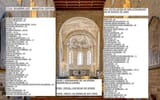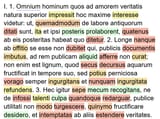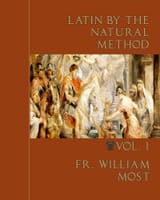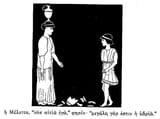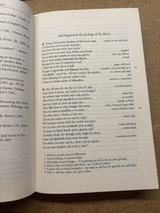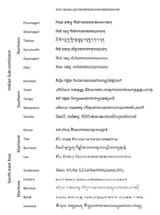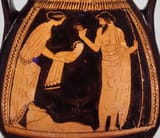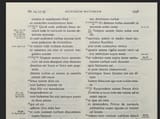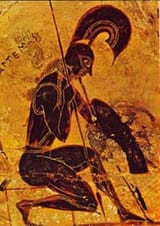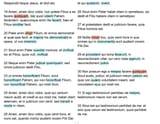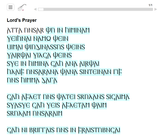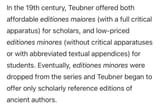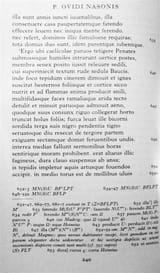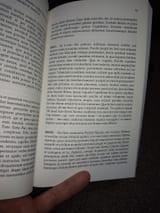Anonymous
8/25/2025, 8:27:20 PM
No.24669573
>>24670956
/clg/ - Classical Languages General
Carolingian edition
>τὸ πρότερον νῆμα·
>>24643783
>Μέγα τὸ Ἑλληνιστί/Ῥωμαϊστί·
https://mega dot nz/folder/FHdXFZ4A#mWgaKv4SeG-2Rx7iMZ6EKw
>Mέγα τὸ ANE·
https://mega dot nz/folder/YfsmFRxA#pz58Q6aTDkwn9Ot6G68NRg
>Work in progress FAQ
https://rentry dot co/n8nrko
All Classical languages are welcome.
Anonymous
8/25/2025, 8:46:34 PM
No.24669625
>>24692674
Classical Arabic is a very beautiful language that is important to learn for spiritual reasons.
The full Arabic Mushaf is actually a rare book in the West and is fully illuminated with decorations and calligraphy.
Most are printed in the holy city of Madinah. There is not a single book store or library here that carries a single copy, many big universities even lack a proper Mushaf.
I share here an excellent article that has cleared up many issues I have felt for quite a long time. I have always found the criticism directed at Aristotle's physics far too harsh and excessive, so had I long noticed that the infamous passage about the heavier object falling faster had been (often wilfully) misinterpreted and taken out of context. This paper is refreshing and restores some sense, and the Aristotelian I once was is delighted. You can disregard the most technical aspect and focus on the conclusion and the exposition. I'm glad as well that Kuhn got shot down in the process.
>>24669612
Rollin'.
Anonymous
8/25/2025, 8:57:24 PM
No.24669642
>>24669735
>>24671577
Latin passage of the thread. Sallust, Bellum Catalinarium, ch3.
His usage is consciously archaic in places. Nevertheless, it should be clear to intermediates and accessible at a reach to beginners.
Remark on salient features such as style or respond in other ways to the text. Don't forget spoiler brackets if you attempt a translation.
>Sed in magna copia rerum aliud alii natura iter ostendit. Pulchrum est bene facere rei publicae, etiam bene dicere haud absurdum est; vel pace vel bello clarum fieri licet; et qui fecere et qui facta aliorum scripsere, multi laudantur. Ac mihi quidem, tametsi haudquaquam par gloria sequitur scriptorem et actorem rerum, tamen in primis arduum videtur res gestas scribere: primum, quod facta dictis exaequanda sunt; dehinc, quia plerique, quae delicta reprehenderis, malevolentia et invidia dicta putant, ubi de magna virtute atque gloria bonorum memores, quae sibi quisque facilia factu putat, aequo animo accipit, supra ea veluti ficta pro falsis ducit. Sed ego adulescentulus initio, sicuti plerique, studio ad rem publicam latus sum ibique mihi multa advorsa fuere. Nam pro pudore, pro abstinentia, pro virtute audacia, largitio, avaritia vigebant. Quae tametsi animus aspernabatur insolens malarum artium, tamen inter tanta vitia imbecilla aetas ambitione corrupta tenebatur; ac me, cum ab reliquorum malis moribus dissentirem, nihilo minus honoris cupido eadem, qua ceteros, fama atque invidia vexabat.
Anonymous
8/25/2025, 8:59:13 PM
No.24669645
>>24670069
>>24670096
>>24669612
Paragraph 1 of Dante's De Monarchia
>1. Omnium hominum quos ad amorem veritatis natura superior impressit hoc maxime interesse videtur:
I am a little baffled as to whether interesse is rightly translated as a noun meaning "interest" or as a verb conjugation of intersum meaning "to lie between." When I double checked the sentence in any given translation app, it translates it as "interest" while perseus and wiktionary give it as "to lie between. The sentence makes total sense as interest, this is a late medieval text, and wiktionary shows that most languages that loaned this term loaned it with the primary meaning of interest, but perseus and LS seem to disagree. So I assume Dante meant it as "interest" and simply has some of his medieval italian meanings bleeding through into his Latin, but I am not 100% sure.
Anonymous
8/25/2025, 9:00:06 PM
No.24669646
Anonymous
8/25/2025, 9:03:46 PM
No.24669653
>>24671056
>>24669612
opus bonus. volvo
Anonymous
8/25/2025, 9:07:02 PM
No.24669658
>>24669612
>>24669629
Richerus. Neat. I'm rusted in Latin and I have little experience in mediaeval stuff.
Oratio Ingonis pro se apud regem et principes suasorie habita. Deum voluntatis meae conscium testor, nihil mihi fuisse carius vestra salute. Vester amor ad hoc me impulit. Ob vestram salutem in has me miserias praecipitavi. Pro omnium vita, tantum periculum subire non expavi. Grande quidem est gestum negotium, sed major est negotii utilitas. Regiam majestatem me laesisse quidem non abnuo, sed multa commoda in facinore comparata assero. Consideretur auctoris animus, animadvertatur etiam futura facinoris utilitas. Tirannum captum metus causa baptismum petiisse adverti, eumque postquam dimitteretur, pluribus injuriis vicem redditurum, suorumque stragem gravissime ulturum. In quem, quia futurae cladis causa visus est, ferrum converti. Haec est mei facinoris causa. Haec me ad scelus impulit. Hoc ob regis suorumque salutem peregi. Et utinam morte mea, patriae libertas, rerumque tranquillitas consequantur! Sed si occidor, ob regis primatumque salutem occisus videbor. Cogitet jam quisque, an pro hujusmodi mercede ei militandum sit; et an pro fide servata, tali habendus sit retributione. Ecce capitis et pectoris laterisque recentia vulnera! Patent praecedentium temporum cicatrices, dispersique per reliqua corporis membra livores. Quorum assiduis doloribus confectus, nihil post tot mala, nisi mortem, malorum finem exspecto. Qua conquestione alios ad benivolentiam traxit, alios vero ad lacrimas impulit. (Hist. 1.11)
The persuasive speech of Ingo in his defence in front of the king and principes. I call God who does know my heart to witness that nothing has been to me dearer than your well-being. It was your love which forced me to the deed. For your well-being, in these miseries I cast myself. For all lives, I don't shy from such a danger. Important indeed was the action but the utility from the action is greater. I don't reject that I offended the majesty of the king but I affirm that many advantages were obtained in the act.
I pause and will translate the rest later, I have to eat.
Anonymous
8/25/2025, 9:25:52 PM
No.24669694
Anonymous
8/25/2025, 9:30:34 PM
No.24669704
>>24669629
That's an excellent paper, and I'm glad to see other anons reading it.
Anonymous
8/25/2025, 9:46:33 PM
No.24669735
>>24669738
>>24669642
>>24669612
Can someone do one for Greek
Anonymous
8/25/2025, 9:48:21 PM
No.24669738
>>24669735
I can do that, I have the perfect reference.
Alright, I drafted a list of authors, opinion? I think we should exclude stuff with lesser literary value (Solon, Empedocles, Plotinus, Origen...), authors too fragmentary (Sappho is the main concern, Callimachus, Aristotle), and perhaps balance a bit more philosophy, history, poetry, and prose? What do you think? Should we also aim at easier authors and prune difficult text? I did not include much after the fifth century because we need the text to be easy to find and it's honestly a bit boring to read Basil of Caesarea or Athanasius of Alexandria with no interest in theology.
00 Homer
01 Hesiod
02 Solon
03 Theognis
04 Sappho
05 Anacreon
06 Aesop
07 Parmenides
08 Empedocles
09 Pindar
10 Bacchylides
11 Herodotus
12 Aeschylus
13 Sophocles
14 Euripides
15 Aristophanes
16 Anaxagoras
17 Democritus
18 Gorgias
19 Antiphon
20 Hippocrates
21 Thucydides
22 Lysias
23 Andocides
24 Isocrates
25 Demosthenes
26 Aeschines
27 Lycurgus
28 Xenophon
29 Ctesias
30 Plato
31 Aristotle
32 Theophrastus
33 Menander
34 Callimachus
35 Apollonius of Rhodes
36 Aratus
37 Theocritus
38 Moschus
39 Bion of Smyrna
40 Leonidas of Tarentum
41 Asclepiades of Samos
42 Posidippus
43 Meleager of Gadara
44 Antipater of Sidon
45 Epicurus
46 Cleanthes
47 Pyrrho
48 Aristoxenus
49 Polybius
50 Euclid
51 Septuagint
52 Aristeas
53 Dionysius of Halicarnassus
54 Philodemus of Gadara
55 Babrius
56 Isidorus
57 Oppian of Cilicia
58 Plutarch
59 Lucian of Samosata
60 Strabo
61 Philostratus
62 Dio Chrysostom
63 Favorinus of Arelate
64 Aelius Aristides
65 Galen
66 Artemidorus Daldianus
67 Athenaeus of Naucratis
68 Aelian
69 Diogenes Laertius
70 Pausanias
71 Pseudo-Apollodorus
72 Chariton
73 Achilles Tatius
74 Longus
75 Xenophon of Ephesus
76 Heliodorus of Emesa
77 Alciphron
78 Posidonius
79 Josephus
80 Diodorus Siculus
81 Appian
82 Arrian
83 Cassius Dio
84 Alexander of Aphrodisias
85 Epictetus
86 Marcus Aurelius
87 Sextus Empiricus
88 Plotinus
89 Porphyry of Tyre
90 New Testament
91 Origen
92 Quintus Smyrnaeus
93 Nonnus
94 Synesius
Let me know before I edit the picture. Oh, and I thought we could also include suggest passages to read, to avoid people to get lost in fragments and nonsensical stuff.
Anonymous
8/25/2025, 10:52:59 PM
No.24669881
>>24669898
>>24669861
>to avoid people to get lost in fragments and nonsensical stuff.
This isn't a list of recommendations. It's a list just to get people reading.
Anonymous
8/25/2025, 10:59:18 PM
No.24669898
>>24669881
I mean to avoid letting them pick up Callimachus or Alcaeus and sink into incomprehensible fragments, for example. An inexperienced reader might try Aeschylus or Homer and end up with a difficult text riddled with cruces, or with a catalogue episode where a billion proper names march past. Suggesting passages and removing the more complex authors (a good part of Archaic poetry should be dropped, in this case) could prevent users from being put off. Especially since, well, even on /clg/ we have more Latinists than Hellenists. The purpose is recreational, it must not turn into a pensum.
Anonymous
8/25/2025, 11:12:22 PM
No.24669930
>>24669612
Anonimus divus.
Anonymous
8/25/2025, 11:30:09 PM
No.24669967
>>24669861
you forgot to exclude dubs in your ordering. Otherwise I have no opinion since I am not familiar enough with ancient Greek.
Beyond that, part of the fun of a random table is getting thrown into odd fragmentary texts that they would not otherwise read. That's why I just took an entire category from the latinlibrary, it's easy to access and has a bunch of relatively obscure but worthwhile stuff.
If the breadth of ancient greek is too vast to fit on a table consider just making separate genre or period-specific tables. More variety can't hurt.
Anonymous
8/25/2025, 11:33:38 PM
No.24669973
>>24670059
>>24670666
>>24669612
Rolling for something obscure.
Anonymous
8/26/2025, 12:14:02 AM
No.24670052
>>24669629
bretty good pic, interesting read
Anonymous
8/26/2025, 12:15:51 AM
No.24670059
>>24669973
I'm thinking I'll make a table for each of the categories on thelatinlibrary including the misc table, and then maybe eventually make a combined image where you double roll, once for which table and once within the table.
Anonymous
8/26/2025, 12:21:47 AM
No.24670069
>>24669612
>>24669645
Well, I'm still at a late beginner level in terms of reading ability, so this was well beyond that, but it was fun to do a close breakdown-analysis since I have Lute now, and get to basically just deep study some vocab and unfamiliar grammar for a 100 word passage. Dante also uses some divergent spelling which makes it harder to look words up. I think since the answer to improvement is basically always just "more thoughtful reading" I can't really go wrong, I can just be inefficient as long as I am doing something.
Anonymous
8/26/2025, 12:22:50 AM
No.24670070
>>24671024
I don't know if this has been posted already, but here you have a lot of easy Latin readers in digital format:
https://www.fabulaefaciles.com/library/books
I recommend Pons Tironum if you are in the post Familia Romana plateau.
Anonymous
8/26/2025, 12:33:47 AM
No.24670096
>>24669645
"interest" is one valid translation in classical latin too, it just depends more on the context since intersum has various meanings, from literally taking part to something, to express difference, but also "interest" as in concern to someone
Anonymous
8/26/2025, 1:05:23 AM
No.24670154
Anonymous
8/26/2025, 1:05:43 AM
No.24670156
>>24670413
What's the Liddel-Scott equivalent for Latin in printed edition? I love a good, heavy tome that can serve both as scholarly reference and also as blunt weapon or shield just in case.
Anonymous
8/26/2025, 2:42:10 AM
No.24670411
>>24670416
>>24669861
I think its part of rolling to expect it to go either good or bad, so more than the difficulty of the text itself, they should be easy to find online, no excessive messing about trying to get to the text itself.
Anonymous
8/26/2025, 2:43:11 AM
No.24670413
>>24670156
Oxford Latin Dictionary. Older editions are 1 volume
Anonymous
8/26/2025, 2:44:15 AM
No.24670416
>>24670411
Exactly. If one is a beginner and they get thrown into an advanced text that's part of the fun, which is why it's not that long of a reading. That's the fun of rollan
Anonymous
8/26/2025, 4:10:58 AM
No.24670544
Anonymous
8/26/2025, 4:36:59 AM
No.24670603
>>24670615
How many days until Lucius Reinardus does a video on Lute?
Anonymous
8/26/2025, 4:41:45 AM
No.24670615
>>24670603
imagine he'll take exactly how I'm using it but tell you to reread the same passage 500 times and call it the Ranieri-Anon method.
Anyways. Something I've been thinking about is that whenever the peak of British Classics education is discussed is that many students were writing their own poetry or prose. Whatever happened to these works? Are they just sitting somewhere undigitized? It seems odd to me that there could be centuries of work by fairly accomplished academics in Latin/Greek that just goes totally inaccessible.
Anonymous
8/26/2025, 5:05:03 AM
No.24670666
>>24670674
>>24670761
>>24669973
This is the money shot from the Declaratio Arbroathis.
>Non enim propter gloriam, diuicias aut honores pugnamus set propter libertatem solummodo quam Nemo bonus nisi simul cum vita amittit.
https://en.wikipedia.org/wiki/Declaration_of_Arbroath
Anonymous
8/26/2025, 5:08:45 AM
No.24670674
>>24670666
Vade retro, Satana. Someone else can have those trips. Rerolling.
In taberna quando sumus,
non curamus, quid sit humus,
sed ad ludum properamus,
cui semper insudamus.
Quid agatur in taberna,
ubi nummus est pincerna,
hoc est opus, ut queratur,
sed quid loquar, audiatur.
Quidam ludunt, quidam bibunt,
quidam indiscrete vivunt;
sed in ludo qui morantur,
ex his quidam denudantur,
quidam ibi vestiuntur,
quidam saccis induuntur.
Ibi nullus timet mortem,
sed pro Baccho mittunt sortem.
Primo pro nummata vini,
ex hac bibunt libertini,
semel bibunt pro captivis,
post hec binbunt ter pro vivis,
quater pro Christianis cunctis,
quinquies pro fidelibus defunctis,
sexies pro sororibus vanis,
septies pro militibus silvanis.
Octies pro fratribus perversis,
novies pro monachis dispersis,
decies pro navigantibus,
undecies pro discordantibus,
duodecies pro penitentibus,
tredecies pro iter agentibus.
Tam pro papa quam pro rege
bibunt omnes sine lege.
Bibit hera, bibit herus,
bibit miles, bibit clerus,
bibit ille, bibit illa,
bibit servus cum ancilla,
bibit velox, bibit piger,
bibit albus, bibit niger,
bibit constans, bibit vagus,
bibit rudis, bibit magus.
Bibit pauper et egrotus,
bibit exul et ignotus,
bibit puer, bibit canus,
bibit presul et decanus,
bibit soror, bibit frater,
bibit anus, bibit mater,
bibit ista, bibit ille,
bibunt centum, bibunt mille.
Parum centum sex nummate
so durant, ubi immoderate
bibunt omnes sine meta,
quamvis bibant mente leta.
Sic nos rodunt omnes gentes
et sic erimus egentes.
Qui nos rodunt, confundantur
et cum iustis non scribantur.
Anonymous
8/26/2025, 5:21:26 AM
No.24670716
>>24670729
Anonymous
8/26/2025, 5:29:06 AM
No.24670729
>>24670741
>>24670716
Non mihi, Anonime, non mihi, sed scholari anonymo saeculi medii da gloriam.
Anonymous
8/26/2025, 5:34:20 AM
No.24670741
>>24670745
>>24670729
Of course not you, I mistakenly attributed it to the Archpoet
Anonymous
8/26/2025, 5:38:02 AM
No.24670745
>>24670741
Miserere mei, enim ignarus sum.
Anonymous
8/26/2025, 5:43:39 AM
No.24670761
Anonymous
8/26/2025, 8:03:56 AM
No.24670956
>>24670980
>>24669573 (OP)
why do the classics guides in the mega all begin with "this does not encourage any sort of immorality or crime"
Anonymous
8/26/2025, 8:26:01 AM
No.24670980
>>24670988
>>24670956
Because the Classics are the chuddiest corpus on Earth and so we need people to know we are a board of peaceful incels
Anonymous
8/26/2025, 8:33:59 AM
No.24670988
>>24670996
Anonymous
8/26/2025, 8:40:21 AM
No.24670996
>>24670988
Nice digits niggerfaggot
Anonymous
8/26/2025, 8:41:22 AM
No.24670999
>>24671024
something wrong with page 17
>>24661812
Anonymous
8/26/2025, 8:59:27 AM
No.24671024
>>24670999
checked
What ya read today /clg/?
Today I did the wedding at Cana and Jesus expelling the moneylenders from the temple in the gospel of John, 102 words of De Monarchia from the rolling chart, which took about 5 times as long as the vulgate reading, I made entries for most of the tavern song from the Carmina Burana, and ~10 entries each from the other texts in picrel. As expected, the amount of entries I have to make to read a text has dropped sharply, especially for the Vulgate, where on each page I am encountering mostly just inflections of already covered words by now. The plan now is to make more tables based on thelatinlibrary at some point, and keep working at the Vulgate while plinking away at whatever other random texts I feel like.
>>24670070
I've seen this site before. My issue with readers isn't that they're too hard, or too easy, it's that I just am not particularly interested in reading them, and I would rather just struggle through a proper text slowly. Even in an "easy" text like the gospel of John I am encountering the subjunctive and getting used to it over and over. If I read readers that avoid most syntax and grammar until near the end of the text, if they use it at all, how will I get used to difficult syntax and grammar at a reasonable pace? So far, reading with training wheels has been enjoyable and rewarding.
Anonymous
8/26/2025, 9:30:42 AM
No.24671056
>>24671072
>>24669653
just buy the books you read , hoarder mf pseud alert.
why pseuds cant resist buying not one, but all Loebs??
Anonymous
8/26/2025, 9:43:49 AM
No.24671072
>>24671082
>>24671056
Next he’s gonna start a podcast with his bookshelf in the background so everyone can know how intelligent he is.
Anonymous
8/26/2025, 9:47:34 AM
No.24671076
>>24671211
Anonymous
8/26/2025, 9:54:40 AM
No.24671082
>>24671072
mega pleb alert, bet dude has a lisp.
I mean dont try to act like youre smart asl by owning these, I mean its widespread common knowledge, everybody knows that greek literature is considered a classic, even a quick google search would show you that, its no rocket science. I assume it would only provoke eye rolling and bit of cringe trying to 'show off' these books. Its one fo the cheapest ploys to look smart imo.
only real patricians store their books in containers for storage and preservation in the basement
Anonymous
8/26/2025, 12:29:34 PM
No.24671211
>>24671237
>>24672032
>>24671076
the interrogative pronoun is quis, quid i.e quis covers male and female so you only get quem for the accusative
Anonymous
8/26/2025, 12:48:13 PM
No.24671237
>>24671580
>>24671211
Don't know what you're talking about. Learn to type.
Anonymous
8/26/2025, 3:06:53 PM
No.24671407
>>24671447
>>24671525
Anonymous
8/26/2025, 3:35:21 PM
No.24671447
>>24671525
>>24671996
>>24671407
Who cares? LLPSI is not great.
>>24671407
They look less interesting than LLPSI though, and with the widespread availability of audio sources over the internet, I see less reason to use such a book other than supplementarily as simple reading material.
>>24671447
LLPSI expects you to magically learn Latin grammar by showing you pictures of feet over and over again.
Anonymous
8/26/2025, 4:42:03 PM
No.24671577
>>24669642
πεῖραν ἔλαβον τοῦ Ἑλληνιστὶ μεταφράσαι, ἰδού·
Κατὰ δὲ τὰ ἀνθρώπεια τὰ πόλλα ἡ φύσις ἑτέραν ἑτέρῳ παρέχει ὁδόν· ἀγαθὸν τὸ ὑπὲρ πόλεως καλῶς πράττειν κοὐχί γ' αἰσχρὸν τὸ εὖ ὑπὲρ αὐτῆς λέγειν· ἔστι δὴ ἐπ' εἰρήνης ἢ πολέμου ὁτῳοῦν λαμπρὸν γενέσθαι, καὶ τῶν τι πεπραχότων καὶ περὶ πεπραγμένων γραφόντων πολλοὶ οἱ ἐπαινούμενοι.
Ἀλλὰ φαίνεταί μοι δὲ κλέους μηδαμῶς ὁμοίου ὄντος τῷ γηρούοντι ὡς τῷ πεπραχότι οὐδὲν ἧττον παγχάλεπον τὰ εὐδόκιμ' ἔργα συγγράφειν· πρῶτον ὅτι τοὺς λόγους δεῖ ἀντιπάλους καθαστῆσαι τοῖς πράγμασι· δεῦτερον ὅτι πολλοὶ τὰ μὲν ἤλεγξες πλημμελῆ διὰ φθόνον ἢ πονηρίαν σε γράφεσθαι ἡγοῦνται, τὰ δὲ μεγάλῃ τιν' ἀρετῇ καὶ δοκιμώτατα, ἐὰν μέν τις εὐπορὰ ἠγῆται, εὖ ἔχων δέχεται, ἐὰν δὲ μή, ὡς προσποιούμενα ἀντὶ ψευδῶν.
Ἔγωγ' ὅτ' ἦν νεανίσκος κατὰ τὸν ἐπιτυχόντα τρόπον σπουδῇ τῆς πολιτικῆς ἐπιμελούμενος πολλὰ ἀντέσχεν ἀντίπαλα· ἀντὶ γὰρ αἰδοῦς μετριότητος ἀρετῆς ἐκράτουν ἀυθάδεια δωροδοκία πλεονεξία· ἅ κεἰ οὐδέν' ἐποιοῖτο τὸ δ'ἐμὸν κῆρ ἄηθες τῶνδε κακῶν ὄν, ἡλικία οὐδὲν ἦττον ἐπλάγχθη δι' ἁμαρτημάτων διεφθαρμένη φιλοτιμίᾳ· καταφρονοῦντι δ'ἐμοὶ τὰς τῶν πολλῶν πονηρίας αὕτη ἡ ἐκείνων φιλοτιμία καὶ τιμὴ καὶ φθόνος πράγματα παρεῖχον.
Anonymous
8/26/2025, 4:43:07 PM
No.24671580
>>24671959
>>24671237
Shockingly retarded.
Anonymous
8/26/2025, 7:53:25 PM
No.24671877
>>24672038
literally any south indian script > devanagari
why did indians choose the ugliest one to write sanskrit with?
Anonymous
8/26/2025, 7:56:38 PM
No.24671883
Does anyone have anything on how Latin verb system developed from PIE?
I swear I saw some once, but I cant find anything now.
Anonymous
8/26/2025, 8:25:47 PM
No.24671959
>>24671987
>>24671580
The accusative can be in a question. Learn how to make a point. You write like a retard.
Anonymous
8/26/2025, 8:31:27 PM
No.24671970
>>24672004
>>24671525
stfu fanboy faggot
Notice how there is zero intellectual discourse in this general about induction. Any criticism of it is met by ridicule and emotional outbursts.
It's a waste of time to set up some kind of mini Sherlock Holmes guesswork every time a new word or grammatical point is introduced, to make it vague deliberately, just for its own sake, there are faster and more efficient ways to learn than this retarded method.
Anonymous
8/26/2025, 8:36:45 PM
No.24671977
>>24672005
>>24672418
>>24671525
>look less interesting than LLPSI though
That’s why I personally preferred to read picrel more. All the early readings are just Roman history, and I much preferred to read about battles with vocab that’s going to apply clearly to what I really want to read (history and Caesar) than to read about slaves arguing over whose boyfriend is better. Not to say LLPSI isn’t enjoyable, it’s just that one holds my attention when I’m in the struggle phase of learning better.
Anonymous
8/26/2025, 8:41:01 PM
No.24671987
>>24672036
>>24672050
>>24671959
Who even needs 4chan anymore? Chatgpt is better.
§§§~~~§§§
if the speaker doesn't know the gender of the person Julia is calling, then Latin forces you to choose a gendered form of the pronoun (since Latin lacks a gender-neutral equivalent of “whom”). Here's how to handle that:
Correct and idiomatic options:
1. Quem Iulia vocat?
Standard default when gender is unknown.
Technically masculine, but in Latin, the masculine accusative (quem) is often used generically when the gender is unknown or mixed.
So even if Julia might be calling a woman, this is still acceptable.
Translation: "Whom is Julia calling?"
(with quem understood generically — similar to English "who" when gender is unclear)
Why not "Quam Iulia vocat?" in this case?
"Quam" is strictly feminine, so it implies you know the person being called is female.
Using quam when the gender is unknown would be misleading or overly specific.
Summary:
Use "Quem Iulia vocat?" when the gender is unknown — it's the proper, idiomatic way to ask.
Anonymous
8/26/2025, 8:42:20 PM
No.24671996
Anonymous
8/26/2025, 8:46:04 PM
No.24672004
>>24672010
>>24671970
You just haven't tried hard enough. This picture should make it clear what a gerund is.
Anonymous
8/26/2025, 8:46:20 PM
No.24672005
>>24672198
>>24671977
The narrative in LLPSI is dumb. I checked out that book and wasn't immediately impressed but I'll take another look. I don't know why the book says the natural method when there is English in it.
https://archive.org/details/Latin_method_Most_1stYear
Anonymous
8/26/2025, 8:47:42 PM
No.24672010
>>24672004
post made by a true intellectual
Anonymous
8/26/2025, 8:52:21 PM
No.24672019
>>24672059
>>24672471
>>24671525
>LLPSI expects you to magically learn Latin grammar by showing you pictures of feet over and over again.
God, I wish that's how language learning worked.
I'd probably be fluent in all East Asian languages by now.
Anonymous
8/26/2025, 8:57:50 PM
No.24672032
>>24672065
>>24671211
Would you not use quae even if it's interrogative with a strong presumption that the answer will be a woman? e.g. "quae scripsit?" in reference to a graffito in a women's restroom.
Anonymous
8/26/2025, 8:59:19 PM
No.24672036
>>24673089
>>24694824
>>24671987
There's two problems. One, asking ChatGPT doesn't bump the thread. We need you to keep posting to keep the thread bumped. Two, is ChatGPT even right? Can you find a grammar that says you use "quem" primarily to be gender-neutral?
It doesn't say that here.
https://dcc.dickinson.edu/grammar/latin/relative-interrogative-and-indefinite-pronouns
Anonymous
8/26/2025, 8:59:25 PM
No.24672038
>>24682284
>>24671877
Which one do you think is the prettiest? Siddham, Tibetan, and Thai are all up there for me.
Anonymous
8/26/2025, 9:02:59 PM
No.24672050
>>24670711
I will never understand classical muh vowel quantity poetry. I'm a simple man who likes rhyme.
Anonymous
8/26/2025, 9:06:40 PM
No.24672059
>>24672067
>>24672019
Yet another fangirl. Thanks for proving my point. LLPSI tries to teach through clues, it deliberately obscures in order to have you guessing, thinking this guesswork somehow aids learning. When the word "venit" is introduced in the book the meaning is meant to be told through two clues, a picture containing a foot at the edge, and the fact the second passage has Aemilia in it while the first doesn't, which is emphasized by having the first line of each passage giving you the names of the people that are in the "scene".
Anonymous
8/26/2025, 9:09:41 PM
No.24672065
>>24672078
>>24672032
I don't make the rules of Latin or have the licence to invent new grammar even if it makes things clearer, the simple interrogative pronoun and composites has only a 2-way declension like third declension adjectives of -is, -e type, it's what it is, same is true even for indefinites like aliquis, quispiam, etc...
Anonymous
8/26/2025, 9:10:30 PM
No.24672067
>>24672086
Anonymous
8/26/2025, 9:11:04 PM
No.24672070
>>24672549
>>24672056
Try listening to a proper recitation in reconstructed pronunciation.
Anonymous
8/26/2025, 9:13:27 PM
No.24672078
>>24672166
>>24672065
Wiktionary seems to think that interrogative quae is a thing, noting:
>3Feminine quis and quem are attested mainly in early Latin authors (Ennius, Pacuvius, and Plautus).
Anonymous
8/26/2025, 9:14:27 PM
No.24672080
>>24673523
Anonymous
8/26/2025, 9:15:44 PM
No.24672086
>>24672096
>>24672067
Fuck off with your jokes, I'm here for serious discussions.
>>>/bant/
>>>/int/
>>>/lgbt/
>>>/mlp/
>>>/b/
Anonymous
8/26/2025, 9:19:17 PM
No.24672096
>>24672086
Fuck off with your serious discussions, I'm here for jokes.
>>>/trash/
Anonymous
8/26/2025, 9:47:30 PM
No.24672166
>>24672202
>>24672739
>>24672078
Yes "interrogative quae" is "a thing," but I think, if anything, we can say the primary rule is that "quis" tends to be substantive and "quae" adjective, although this is not absolute.
>Note— But quī is often used without any apparent adjective force; and quis is very common as an adjective, especially with words denoting a person.
>Quī nōminat mē? Who calls my name?
>Quis diēs fuit? What day was it?
>Quis homō? What man?
>But often
>Quī homō? What kind of man?
>Nesciō quī sīs. I know not who you are.
And A&G also points out another interesting point.
>a. The singular quis is either masculine or of indeterminate gender, but in old writers it is sometimes distinctly feminine.
Anonymous
8/26/2025, 9:58:19 PM
No.24672184
>>24672439
>>24694833
I want to learn Hebrew but I don't want to become more sympathetic to kikes. What do I do?
Anonymous
8/26/2025, 10:03:03 PM
No.24672198
>>24672208
>>24672005
The "natural" way proposed by Fr. Most is not the same thing as the Nature Method(tm) of the Nature Method Institute and one publishing house doesn't have a monopoly on the concept of "naturalness."
>>24672056
>>24670711
Anonymous
8/26/2025, 10:04:24 PM
No.24672202
>>24672439
>>24672166
The question was about the accusative, quem vs quam, "whom" in English.
Anonymous
8/26/2025, 10:05:26 PM
No.24672208
Anonymous
8/26/2025, 10:11:37 PM
No.24672418
>>24672608
>>24671977
I thought that Most was tedious compared to LLPSI, especially starting out, but you're right that the first part does actually give a fairly decent overview of Roman history, and Most's irreverent treatment in places (in particular, repeatedly dismissing Cicero as an arrogant blowhard) could give student's something to latch onto.
Your portrayal of LLPSI a little misleading. Familia Romana focuses primarily on the Roman family and side characters, but it has two chapters primarily about military matters, and I'm only guessing, but I suspect that LLPSI's vocabulary is more targeted to Caesar than Most's is. Outside of Familia Romana, LLPSI is pushing to student to read Caesar in the De Bello Gallico reader and to read about Roman history in Roma Aeterna, where, in contrast, Most says he does not think students should be pushed to read Caesar so early because Caesar is too difficult, and (depending on what you mean by history) the history in the second volume is mostly biblical history.
I can also see how Most would be more gently graded for beginning students than LLPSI.
Anonymous
8/26/2025, 10:18:14 PM
No.24672439
>>24672460
>>24672184
Maybe learning German would cancel it out.
>>24672202
I suppose the accusative is a totally different question from the nominative. Looks like you'll have to find another grammar. Or just ask ChatGPT.
Anonymous
8/26/2025, 10:25:32 PM
No.24672460
>>24672439
Germans are too sympathetic to kikes
Anonymous
8/26/2025, 10:30:52 PM
No.24672471
>>24672019
For me, it's ancient greek.
Anonymous
8/26/2025, 11:09:59 PM
No.24672549
>>24672070
I have. Still don't understand it.
Anonymous
8/26/2025, 11:26:24 PM
No.24672608
>>24672418
>Most's irreverent treatment in places (in particular, repeatedly dismissing Cicero as an arrogant blowhard) could give student's something to latch onto.
Of all the criticisms I've seen of the text, this is the one I see the most, so I'm glad to see even a single person acknowledge that jokes and silly non-sequiturs (such as the exercises after the lesson) can actually be fun and encouraging for a student. You're probably right that LLPSI has vocab that's more applicable to Caesar, while LNM is a little broader and preps more for the vulgate. People obsess too much over the elegance of the reader rather than how engaging it is for students and how quickly, easily, and effectively it will prep a student to read. (Especially for autodidacts sharing materials over the internet, a lot of people with degrees on forums and other sites seem to forget that a lot of us are hobbyists).
Also, Cicero was an arrogant blowhard.
Anonymous
8/26/2025, 11:50:34 PM
No.24672673
Anonymous
8/27/2025, 12:14:30 AM
No.24672739
>>24672166
What if it's a verb whose answer can by definition only be a woman- can you say "quae peperit" or "quae menstruavit", even?
Anonymous
8/27/2025, 2:25:18 AM
No.24673089
>>24673138
>>24672036
nigger it's in your link
>a. The singular quis is either masculine or of indeterminate gender, but in old writers it is sometimes distinctly feminine.
>or of indeterminate gender
Anonymous
8/27/2025, 2:53:45 AM
No.24673138
>>24673159
>>24673089
I said accusative, but you all keep talking about everything but accusative.
Anonymous
8/27/2025, 3:00:08 AM
No.24673159
>>24673138
If a word is appropriate, it's appropriate in other cases.
Whats the best audio for listening fluency with latin? Ive been trying with de bello gallico but the source ive used reads too fast and is difficult to follow along with
Anonymous
8/27/2025, 5:33:28 AM
No.24673496
How approachable is the Waldron edition of Sir Gawain and the Green Knight from the perspective of someone who has zero prior experience with verse or classical languages? I was gifted a copy from my mom before I got around to looking into translations myself, but from having looked at the first page I'm struggling to make connections from the raw text to the footnote explaining things. There is a glossary where I noticed that you can make some connections to modern words when read aloud (such as from sesed to ceased), but I don't know if this is the kind of thing that will be palatable if I just brute force it, looking up every word I come across.
Anonymous
8/27/2025, 5:42:45 AM
No.24673523
>>24673528
>>24672080
This is exactly what I'm talking about. I cannot make out any repeating pattern or rhythm here.
Anonymous
8/27/2025, 5:46:40 AM
No.24673528
>>24673618
>>24673523
He is trying too hard, dactylic hexameter is supposed to have a slight pause at the end of each line
This is Greek and not Latin but will give you a better idea
https://www.youtube.com/watch?v=qI0mkt6Z3I0
Bear in mind the rhythm is different from what you're used to. There are a lot of different phrasings within the basic structure of six feet.
Anonymous
8/27/2025, 6:30:52 AM
No.24673613
>>24667825
>Poetry is still impenetrable to me.
shaking my baka
a splendid day to talk about ON poetry anyway
Anonymous
8/27/2025, 6:34:57 AM
No.24673618
>>24673641
>>24673697
>>24673528
>There are a lot of different phrasings within the basic structure of six feet.
Yeah, which is why it all just sounds like droning noise with no structure to me.
Anonymous
8/27/2025, 6:50:00 AM
No.24673641
>>24673618
>structured meter
>"no structure"
Anonymous
8/27/2025, 7:27:27 AM
No.24673697
>>24673618
Maybe it isn't for you then. There are plenty of rhymed poems to enjoy.
Anonymous
8/27/2025, 8:26:49 AM
No.24673773
>>24674289
>>24673517
Use Lute and brute force it.
Anonymous
8/27/2025, 8:54:07 AM
No.24673800
>>24673817
>>24674289
Seems like learning classical chinese with lute would be pretty comfy since there’s no inflection at all and most words are single characters
Anonymous
8/27/2025, 9:06:56 AM
No.24673817
>>24673800
But would it have any way to know word boundaries? Most words are single characters, but not all are.
Anonymous
8/27/2025, 2:17:33 PM
No.24674184
>>24674273
>can easily remember hundreds Greek verbs and their conjugations but struggle to remember nouns/names
>can easily remember Latin nouns/names and their declension but always fumble the verbs
What gives? I feel trapped in classical language's purgatory.
Anonymous
8/27/2025, 3:22:34 PM
No.24674273
>>24674184
sounds weird
what I can say is that the methods I used made a difference as far as active recall of lexicon, e.g I have an easier times recalling Greek words than Latin ones(from my own language n.b), and for Greek I used extensive reading more at the beginning
Anonymous
8/27/2025, 3:31:28 PM
No.24674289
>>24674568
>>24673773
>>24673800
Stop shilling your gimmick app.
Anonymous
8/27/2025, 3:37:51 PM
No.24674308
>>24674350
>>24674367
the intensive reader roars at the 1000 hour baby show watcher
Anonymous
8/27/2025, 3:56:07 PM
No.24674350
>>24674367
>>24674308
>tfw when you can't learn Latin because there's no Latin dub of Peppa Pig yet
Anonymous
8/27/2025, 4:01:48 PM
No.24674367
>>24674568
>>24676253
>>24674350
>>24674308
I know you're joking but I'm so glad there's minimal to no garbage media in Greek and Latin. Fuck. Best part of both languages.
>>24674367
Latin is the only language where the “easy content” is so minimal that I actually have to use good stuff to learn instead of spending 1000+ hours watching travel vlogs and kids shows.
>>24674289
I just think it’s a great tool specifically for what that Anon was asking. Specifically, brute forcing a text with minimal prior grammatical/lexical knowledge. It would suck and be kind of retarded but at least it would be realistically doable compared to using a separate grammar/dictionary. Plus any words encountered would carry over so maybe brute forcing one text, while awful, would excite and encourage them to do more Latin later in a way normal reading wouldn’t. The main reason my advice was retarded is that I thought the original post was asking about a Latin text, totally forgetting Gawain and the Green Knight is written in Middle English.
>>24673517
I find Middle English much easier to understand if I read aloud with modern pronunciation, treating it like English with divergent spelling and a bunch of unknown words, rather than treating it like a foreign tongue. That’s how I got through Chaucer. I wouldn’t call reading it and looking up words where necessary “brute-forcing” it at all. You should be totally fine to just sit down and start reading IMO.
Anonymous
8/27/2025, 7:20:50 PM
No.24674846
>>24674853
>>24675673
>>24673517
In particular as an introduction for Middle English, I can heartily recommend this version of the Canterbury Tales published by QPB classics published in 1991 because it comes with an attached appendix containing cultural notes, idiomatic explanations, and the archaic grammar, as well as a full glossary of the text for archaic vocabulary.
>>24674568
It wasn’t my intention here to imply I literally sat down with the raw text and zero lookups. Rather, I just made an effort to look up stuff as little as possible, with that being much more doable in some sections vs others.
Anonymous
8/27/2025, 7:25:40 PM
No.24674853
>>24674911
>>24674846
I far prefer Wordsworth's edition, it has marginal notes for difficult words and expressions and a brief but efficient introduction to the relevant features of Middle English.
Anonymous
8/27/2025, 7:52:38 PM
No.24674911
>>24674954
>>24674853
On page glossing would certainly be a lot easier. I have to ask though how extensive the on-page glossing is. As a matter entirely of personal preference, I would find it annoying if divergent spellings like groynynge (groaning) were glossed on the page for example.
Anonymous
8/27/2025, 8:13:54 PM
No.24674954
Anonymous
8/27/2025, 8:49:46 PM
No.24675047
>>24675071
>>24675073
Is this really meant to be an inflection of "reno?" It seems obvious to me that it's just a conjunction of re + natus in the context. Perseus is great but it's definitions seem limited in scope at times. I noticed that the vulgate is in their corpus so I'm wondering if they just have a slightly different version of the clementine vulgate than the one on sacredtextsarchive.
I started learning Latin some years ago, but then it fades because of university and later work. But now I'm a catechumen in the Catholic Church so I want to brush up on my Latin. Is just Ørberg good enough?
Anonymous
8/27/2025, 8:56:04 PM
No.24675071
>>24675047
It's obviously re+natus (reborn).
Anonymous
8/27/2025, 8:57:00 PM
No.24675073
>>24675112
>>24675047
Perseus is a pile of shit, don't use it. You can use Collatinus for Latin and Eulexis for Greek on Biblissima.
https://outils.biblissima.fr/en/collatinus-web/index.php
Anonymous
8/27/2025, 9:00:47 PM
No.24675084
>>24675099
>>24675070
Yes, Orberg should be more than enough as a primer to be able to tackle liturgical texts or the Vulgate.
Anonymous
8/27/2025, 9:06:29 PM
No.24675099
>>24675084
Thanks, anon. I do want to read more advanced Roman texts at some later point, like the Aeneid.
Anonymous
8/27/2025, 9:11:34 PM
No.24675112
>>24675070
God bless. It definitely works.
>>24675073
Thanks, I’ll check it out.
Translation challenge:
Easy
He arrived in the woods.
You need an axe to chop wood.
The more we are, the faster we finish.
Medium
Find me someone who can use this thing.
He asked the local shepherd if he knew a spring nearby.
With so many people around the noise might scare bears for good.
Hard
Seeing that the ships sent by the great king had not arrived at the established time and knowing that if they came too late the enemy would take over the island, he devised another plan.
Assuming that the enemy would aim to take the nearest port first, he dispatched all his available cavalry to the nearby villages to find all available men, hoping to be able to at least slow down the enemy onset.
Anonymous
8/28/2025, 12:40:47 AM
No.24675633
>>24674568
>I find Middle English much easier to understand if I read aloud with modern pronunciation, treating it like English with divergent spelling and a bunch of unknown words, rather than treating it like a foreign tongue.
I do the same thing with Old English, though that tends to take a bit more work/adjusting.
Anonymous
8/28/2025, 1:08:25 AM
No.24675673
>>24675956
>>24674846
Thanks, I appreciate the recommendation as well. The Canterbury Tales is something I've always known to be culturally significant, but I never even thought about reading it, I may do that if I enjoy my way through The Green Knight
Anonymous
8/28/2025, 1:10:41 AM
No.24675679
>>24674568
it may be slower but I find Chaucer very enjoyable if you read it out loud with the reconstructed pronunciation
Anonymous
8/28/2025, 1:11:34 AM
No.24675681
>>24673517
The riverside chaucer is what you want
You could also try A Book of Middle English by Thorlac Turville-Petre or An Introduction to Middle English: Grammar and Texts by R. D. Fulk, I think the former is probably better
Anonymous
8/28/2025, 3:37:45 AM
No.24675956
>>24675673
It's really very whimsical and fun. It's a collection of stories very worth reading based on the structure of the Decameron (also worth reading, not that you should learn Italian to do so).
Anonymous
8/28/2025, 4:22:41 AM
No.24676034
>>24675142
I'll stick to easy since i'm still learning this shit
oacic in cuauhtla
tiquinequi in acha cuauhtlapana
no clue for the third tbqh.
God I have a long way to go before I actually understand this language.
Anonymous
8/28/2025, 5:07:19 AM
No.24676118
>>24676226
>>24675142
至林。
須斧以斬木。
我人益多、則事早成。
其求能用之者。
問其地之牧曰:「近有泉乎?」
人之集多也、騒可驚熊而散之。
見定時而大王船未至、知遲來則敵占島、新慮謀。
以為敵將先攻近港、欲遲其進、送諸騎於環村、以求所可得之人。
Some of these are probably in rather inelegant CC, but I tried.
Anonymous
8/28/2025, 5:22:54 AM
No.24676152
Anonymous
8/28/2025, 5:42:31 AM
No.24676196
Anonymous
8/28/2025, 5:56:12 AM
No.24676226
>>24676238
>>24676118
CC is so idiomatic I doubt it’s really possible to have a translation from English into it that is both intelligible and elegant in many cases.
Anonymous
8/28/2025, 6:02:05 AM
No.24676238
>>24676226
You can't translate literally and have it be idiomatic, but you can endeavor to express the thought as an ancient Chinese would. In theory that's always the goal when translating- to express the thought as a speaker of that language would.
I just want one IRL friend in this faggot ass world that’s interested in Latin.
Anonymous
8/28/2025, 6:12:06 AM
No.24676248
>>24676258
>>24676242
Well, what general area are you located in?
Anonymous
8/28/2025, 6:14:54 AM
No.24676253
>>24674367
I'd agree, I think it's quite nice that the 'easiest' text in Latin is the Vulgate. Authors like Caesar are easy to read but really, for modern languages it would be considered a harder text.
Anonymous
8/28/2025, 6:17:08 AM
No.24676257
>>24676270
Anonymous
8/28/2025, 6:17:30 AM
No.24676258
>>24676267
Anonymous
8/28/2025, 6:21:06 AM
No.24676267
>>24676258
Ah, unfortunately I'm in the East, but if you're in one of the major metropolitan areas there are probably other anons near you.
Anonymous
8/28/2025, 6:22:26 AM
No.24676270
>>24676308
>>24676257
Because I have an interest and would like to interact with people with that shared interest but I’m a chuddy 4channer instead of a wholesome r/Latin enthusiast.
Anonymous
8/28/2025, 6:52:06 AM
No.24676308
>>24676409
>>24676270
sounds like r/Latin is more your speed. You can join a discord channel and discuss transitioning and dilation in Latin
Anonymous
8/28/2025, 7:49:00 AM
No.24676396
Lege bibliam tuam.
I think today a major jump in reading speed and comprehension occurred with the gospel of John, in part because I am encountering mostly just new inflections of words I already know. The main slowdown at this point is that what I am doing is making entries for all new inflections so I can keep reminding and internalizing grammar, this is meant to be a close reading so it is intentionally very slow. But I have reached enough comfort with the text where I cleared picrel in close reading in about the same time it would have taken to do 250 words yesterday. I did roughly as much today as I have in the past 4. So far this method seems to work well. I am excited to see how fast I can be reading by the end of the gospel of John, and how quickly I can clear the other 4. Then at that point I think I'll casually read more medieval and patristic texts while making my "daily close-reading" text Caesar.
>>24675070
For an example of how well doing the first 16 chapters of LLPSI prepped me, plus a 5 month period of no Latin, and a smattering of random chapters from other readers plus memorizing some prayers, here's where that has put me in vulgate comprehension when using a word highlighting/dictionary program. Red = Didn't know at all, Orange = guessed meaning from context, Yellow-Green = some mix of vaguely recognizing the word + context.
Anonymous
8/28/2025, 8:01:13 AM
No.24676409
Anonymous
8/28/2025, 3:20:39 PM
No.24677057
>>24677176
>>24677599
mementote forum esse praeter /clg/ ubi vobis datur latine colloqui more quarti canalis,
https://porticuspublica.org
Anonymous
8/28/2025, 3:47:09 PM
No.24677108
>>24676242
same, but for Nahuatl. Or just a friend in general. I am terribly lonely.
Anonymous
8/28/2025, 4:27:52 PM
No.24677176
>>24677185
>>24677057
Yes, the wonderful forum where no one, including yourself, has posted in 3 days, and where most threads go weeks without a post. What a fabulous idea.
Instead of replying here go post there
Anonymous
8/28/2025, 4:36:18 PM
No.24677185
>>24677581
>>24677176
thanks I'll just keep shilling it to just to get more tears from you
Anonymous
8/28/2025, 7:10:16 PM
No.24677581
>>24677185
Sure, anything to keep from posting there, right?
Anonymous
8/28/2025, 7:19:35 PM
No.24677599
>>24677057
I’m not brave enough to post there
Anonymous
8/28/2025, 8:31:57 PM
No.24677786
>>24675142
Easy
Ad silvestria pervenit.
Securi tibi ad ligna caedenda opus est.
Quo plures, eo celerius conficimus.
Medium
Reperi aliquem qui hoc uti possit.
Rogavit pastorem indigenam num fons prope adesset.
Tantis circumstantibus strepitus ursos perpetuo terrere possit.
A relative clause is probably more idiomatic for ‘local’ but I felt like finding a synonym.
Anonymous
8/28/2025, 8:38:46 PM
No.24677801
>>24677836
>>24685071
Does someone here have the current (5th edition, 2007) Stuttgart Vulgate lying around? Weber-Gryson
The scans on Anna's Archive messed up the double page 1548 and 1549 (Matt. 14:11-15:24); if someone could post a legible photo of those, it would be highly appreciated.
Anonymous
8/28/2025, 8:51:21 PM
No.24677836
>>24685071
>>24677801
What is it about the stuttgart vulgate in particular that is special?
Anonymous
8/28/2025, 10:16:09 PM
No.24678047
>>24678705
>>24675142
Plures in essendo, celeriores in conficiendo.
Anonymous
8/28/2025, 10:26:02 PM
No.24678062
>>24678168
>>24675142
Feel free to criticize for the education of the general.
>Seeing that the ships sent by the great king had not arrived at the established time and knowing that if they came too late the enemy would take over the island, he devised another plan.
Videns naves a rege missas non advenisse, sciensque, si nimis sero venirent, hostes totam insulam esse occupaturos, novum consilium cepit.
>Assuming that the enemy would aim to take the nearest port first, he dispatched all his available cavalry to the nearby villages to find all available men, hoping to be able to at least slow down the enemy onset.
Cum censeret ut hostis proximum portum capere primum esset nixurus, misit ad finitimos vicos totum in promptu equitatum, qui omnes in promptu viros inveniret, sperens hostis impetum saltem tardare.
What's the best way to render the first clause? (What's the best verb for "assuming" anyway?)
Any particular adjective or phrase in mind for "available?"
Anonymous
8/28/2025, 11:11:21 PM
No.24678168
>>24678062
good attempt imho
Videns
I think animadvertens fits better, I mean, the phrase could be interpreted as literally seeing with eyes but the general sense is to be aware of something e.g someone might have told him, "seeing" in english here is more circumstantial and less literal
you are also missing the time
I think 'assuming' can reasonably be translated with verbs carrying the meaning of "reckoning" or just thinking i.e it's his opinion, so censeo I think works fine, although I'd use an infinitive phrase not censeo + ut, maybe cum censeret hostes ut proximum portum caperent primum impetum facturos....
maybe promptum equitatum works better in place of totum in promptu, similarly for the other available
also maybe I'd translate the last phrase with something like ea spe ut ....
Anonymous
8/29/2025, 2:30:42 AM
No.24678705
>>24678047
>essendo
this fella spent too much time with greeks
>>24676242
Go loiter on college campuses. Or more seriously go to a Latin mass.
>>24678780
TLM has occurred to me, but I’ve never gone to one. My parish has a NO Latin mass but I’ve never gone since it’s at an odd time/date. At my English NO masses my wife and I are easily the youngest adults there, but I do hear the TLM attracts young married adults a lot more.
Anyways, does anyone have a QRD on what getting into reading classical Gaelic looks like? Anyone on here that can read medieval Gaelic? How are the online dictionaries, insofar as they exist? I think if I ever wanted to start another classical/medieval language besides Latin it would be a close contender with Greek.
Anonymous
8/29/2025, 4:51:54 AM
No.24679006
>>24679097
>>24678780
There's a church in my city that does Latin mass and I'm considering going some time but I don't like the Catholic Church very much. Still, it's not like I can afford to travel to the Roman Empire, so it's likely to be one of my only opportunities to hear Latin spoken in real life.
Anonymous
8/29/2025, 5:00:25 AM
No.24679020
>>24678988
all I know is Old Irish is supposedly one of the hardest Indo-European languages, along with Sanskrit and ancient Greek. but that may not be the same era you're thinking of
Anonymous
8/29/2025, 5:37:36 AM
No.24679097
>>24679127
>>24679243
>>24679006
Go for it. Just make sure to not take communion. No problem whatsoever with visitors.
Anonymous
8/29/2025, 5:51:09 AM
No.24679127
>>24679340
>>24679097
This. I am a lapsed cradle Catholic but still go to church when I visit my hometown. During communion leave the pew with the others, step to the side letting those behind you pass, then return and sit. You will not be the only one and no one will think less of you for it.
Anonymous
8/29/2025, 6:20:45 AM
No.24679180
>>24679199
>>24678780
I have been attending primarily the Latin mass for over a decade, and I haven't met anyone yet who has devoted any serious study to Latin sadly.
Anonymous
8/29/2025, 6:41:06 AM
No.24679199
>>24681169
>>24679180
Some sort of major difference of psychology to intentionally go out of your way to attend mass exclusively in another language and never learn it anyways. When you mean serious study though do you mean through academia? I wouldn’t call what I’m doing “serious” study.
Anonymous
8/29/2025, 6:57:24 AM
No.24679243
>>24679262
>>24679340
>>24679097
Why shouldn't I take communion?
Anonymous
8/29/2025, 7:06:23 AM
No.24679255
>>24680229
>classical sanskrit doesn't have a subjunctive
wtf I thought it was supposed to be harder than latin and greek
Anonymous
8/29/2025, 7:10:47 AM
No.24679262
>>24679340
>>24679243
It is a sacrament requiring baptism, confession, penance, etc.
You are probably just here to argue or be edgy but it is not yours to take. Catholics take communion seriously as part of the covenant between Jesus and man. If you want to go to Latin mass to practice Latin fine, don't desecrate holy traditions in doing so.
I will not be posting again on the matter.
Anonymous
8/29/2025, 8:04:28 AM
No.24679340
>>24679349
>>24679243
>>24679262
It's not only a sacrament, it's THE sacrament.
>>24679127
You can also go up with the others and just cross one or both arms when you reach the priest/minister and receive a blessing instead. Even practicing Catholics are supposed to do this if they think they're not in a proper state to take the Eucharist.
Anonymous
8/29/2025, 8:09:27 AM
No.24679349
>>24679365
>>24679340
But in reality it's just some bread.
Anonymous
8/29/2025, 8:15:17 AM
No.24679365
>>24679377
>>24679349
>tfw to intelligent to wrap my mind around an omnipotent being doing something I find irrational
Anonymous
8/29/2025, 8:19:11 AM
No.24679377
>>24679416
>>24680002
>>24679365
It's not that the concept doesn't make sense to me on its premises, it's just that there aren't actually such things as gods.
Anonymous
8/29/2025, 8:37:28 AM
No.24679416
>>24679377
waoh... badass...
Anonymous
8/29/2025, 9:30:38 AM
No.24679486
>>24679496
>>24678988
There's Old, Middle and modern Irish, just like English. Classical Gaelic refers to a period extending from the middle period into early modern Irish. As for Old Irish, it doesn't have a huge corpus, although the features of the language are present in texts written by learned scribes centuries later.
The only textbook I know that caters to those of us with an interest in middle Irish would be Tim McCone's Old Irish Grammar and Reader, which contains an introduction to Middle Irish at the back (although it assumes you've gone over the previous section).
The eDIL, or electronic dictionary of the Irish language, has entries from the Irish language corpus from 700 to 1700.
If you do go the Old Irish route, the standard textbook is David Stifter's Sengoidelc; there are readers available from the Royal Irish Academy taking selections from the Táin and Geoffrey Keating's History of Ireland.
Also by the RIL is the Irish Texts Society, which publishes many Medieval and Classical Irish texts with a facing English translation, although I imagine they could be hard to come by.
Anonymous
8/29/2025, 9:36:47 AM
No.24679496
>>24680263
Anonymous
8/29/2025, 3:07:40 PM
No.24679927
>>24675142
ἦλθεν εἰς τὴν ὕλην
πελέκεως δέον ἐστὶ τῷ ὑλοτόμῳ
ὅσῳ πλείονες, τοσούτῳ θᾶττον τέλος ἐπιθήσομεν
κόμισαί μοι ὁντινοῦν δύναιτ' ἄν τούτῳ χρῆσθαι
τὸν ἐγχώριον ποιμένα ἀνήρετο εἴ τινα κρήνην εἰδείη πέλας
τοσούτων ἐν τῷ αὐτῷ ὄντων ὁ θόρυβος μέλλει τοὺς ἄρκτους τέλος φοβεῖν
τῶν νεῶν τῷ μεγάλῳ βασιλεῖ ἐσταλμένων οὐχ ἐν ὥρᾳ ἀφιγμένων γνοὺς τοὺς πολεμίους τὴν πάσην νῆσον καταστρεψομένους, εἱ ὀψ' ἀφίξοιντο, ἄλλην συνέθετο βουλήν
τεκμαιρόμενος τοὺς πολεμίους εἰκότως εἰς τὸν ἄγχιστον λιμένα πρῶτον προσβαλοῦντας, πάντας τοὺς παρόντας ἱππέας ἀπέστειλεν εἰς τὰς πέλας κώμας συλλέξοντας τοὺς ὑπάρχοντας ἄνδρας ἐλπίζων ἐμπόδιόν τι ἔσεσθαι τοῖς προσβαλοῦσιν
Anonymous
8/29/2025, 3:45:28 PM
No.24680002
>>24679377
>no gods
>therefore I will go to a religious ceremony and intentionally disrespect the faithful
m'lady
Not particularly religious, just find your attitude disgusting
Anonymous
8/29/2025, 5:23:07 PM
No.24680229
>>24679255
Sanskrit is harder for two major reasons:
>unfamiliarity
>poor resources
The grammar is easier if anything.
Anonymous
8/29/2025, 5:40:25 PM
No.24680263
Anonymous
8/29/2025, 5:48:05 PM
No.24680281
>>24680294
>>24673439
https://www.youtube.com/watch?v=Lk90-9KCftY
I love this guy's cadence. It is a lot more natural.
Anonymous
8/29/2025, 5:54:46 PM
No.24680294
>>24680336
>>24680281
It’s always been funny to me how unnatural sounding people usually are even if they’re making the effort to acquire spoken fluency. But it makes sense since 99% of the time they would probably be talking to others with little speaking practice, so people talk like they’re reading an audiobook slowly.
AFAIK the bald man sounds the way he does in his content because he intentionally slows down and over enunciates for the benefit of his viewers and/or whoever he speaks to. But it makes him sound kind of retarded sometimes. The living latinists would do credit to themselves to produce some content that’s just rapid fire Latin conversation since people could use the practice anyways.
Anonymous
8/29/2025, 6:13:59 PM
No.24680336
>>24680432
>>24680294
Speaking from experience, when you try to get the length down you end up over emphasizing and sounding like you got dropped on the head as a kid. But overtime as you get more used to it you start focusing on the words in relation to the idea/sentence rather than an island of syllables to nail. In the above guy's case, he reads as if he knows what is going on, thereby being a lot more masterful with his pauses and groupings, instead of droning on.
Anonymous
8/29/2025, 6:56:42 PM
No.24680432
>>24680539
>>24681550
>>24680336
Glad I can just ignore length since I prefer veechee to weekee
There's just something about the grammatical complexity of Latin and Greek that I wish modern European languages had. The Romance languages have a lot of verb tenses, but not cases. Slavic languages have the cases but extremely simple verb tenses. Latin and Greek have way more brevity and beauty than languages we speak today and are the only ones that have heavy grammatical inflection as well as complexity in verbs.
Anonymous
8/29/2025, 7:12:19 PM
No.24680481
>>24680680
>>24680455
I’m not a philologist, but cases never struck me as “more complex” than English, just more alien to us. But you are 100% right that Latin feels so elegant because you can express the same thoughts with far fewer words than more analytical languages like modern romance or english.
Anonymous
8/29/2025, 7:33:27 PM
No.24680539
>>24680747
>>24680432
that's a weird lisp
Anonymous
8/29/2025, 8:34:10 PM
No.24680671
>>24680747
>>24680455
>>24680455
Good English prose is sublime in its own way. This is a “grass is always greener” take.
Anonymous
8/29/2025, 8:38:48 PM
No.24680680
>>24680481
>far fewer
Latin writers differ immensely between each other, but Latinity tends towards maximum specification, not compression.
Anonymous
8/29/2025, 9:04:57 PM
No.24680747
>>24680671
Exactly, they’re more different than they are more or less elegant than each other. I’ve met many well educated Romance speakers I’ve met really do appreciate how English sounds in prose and in speech, whether American or British. I always found that funny since many of us see Romance as so sophisticated and our own mother tongue as deficient.
>>24680539
Just my native accent tbqh famalam.
Anonymous
8/29/2025, 10:38:22 PM
No.24681005
>>24681081
>>24681196
People mention the abbot l'homond's Epitome Historia Sacrae, but rarely talk about DE VIRIS ILLVSTRIBVS VRBIS ROMAE A ROMVLO AD AVGVSTVM.
Is it a worthwhile read for someone roughly at EHS's reading level? It seems kind of long, so why not just jump straight into historians?
Anonymous
8/29/2025, 11:09:57 PM
No.24681081
>>24681126
>>24681196
>>24681005
I always recommend it, it's the first booklet I translated learning Latin, and I did it on paper, printed it on front only and wrote the translation on the back
Anonymous
8/29/2025, 11:28:37 PM
No.24681126
>>24681129
>>24681081
Assuming you went for a classics degree if you were translating extensively?
Anonymous
8/29/2025, 11:31:41 PM
No.24681129
>>24681126
just an amateur, I only did translation for learning purposes, Lhomond's De Viris Illustribus and Caesar's CDBG, nothing fancy, but it helped, past Caesar I just stuck to reading(and re-reading)
Anonymous
8/29/2025, 11:49:26 PM
No.24681169
>>24681223
>>24679199
There's a difference between the traditional Latin mass (TLM), and the new mass (the novus ordo, or ordinary form, or whatever you want to call it) is not just that one happens to be conducted in Latin and the other in the vernacular. I don't think it's necessary to go to far down this rabbit hole here, but although the NO can hypothetically be celebrated entirely in Latin, there is still a large difference between the TLM and NO. The people who attend the TLM are not attached to the TLM purely because of the Latin language.
Anonymous
8/30/2025, 12:03:29 AM
No.24681196
>>24681219
>>24681005
I am only familiar with "Fabulae ab Urbe Condita" (Steadman's edition). Besides that, I have seen other editions that are "selections" from the original De Viris. It seems that even if you would be interested in it, it might be hard to come by a printed copy of it. Compare that to EHS, which is readily available as part of the LLPSI series. Then there is also the problem of difficulty. As I understand it, "Fabulae ab Urbe Condita" is supposed to be significantly easier than Llhomond's original, and the original De Viris is also supposed to a significant step up in difficulty over EHS. If it's not significantly easier than just reading Nepos or Livy or whatever directly, then people figure why not just go to the original classical authors? Whether or not that's true, I know that reputation exists because I've read that opinion somewhere.
I also think that there be more willingness and interest in these intermediate-level student works if schools spent more years teaching Latin. As it is, they want to get through 2-3 years with as minimal reading as possible in order to dump students into AP classes to study classical authors (Vergil, etc.). No time to stop and smell the roses.
>>24681081
How did you find the difficulty?
Anonymous
8/30/2025, 12:14:42 AM
No.24681219
>>24681196
>How did you find the difficulty?
quite approachable after having read about half of Wheelock's I think, I have to say, I wasn't diligent enough to finish the book(Wheelock's), but having an ok grasp on the grammar I powered through Lhomond's; maybe being a Romance speaker also helped with some of the lexicon
but then I remember a bit of struggle with DBG too, so I wouldn't suggest anyone to drop the textbook halfway as I did
Anonymous
8/30/2025, 12:18:32 AM
No.24681223
>>24681418
>>24681169
I’m aware, I just think it’s odd because I’ve met a guy who stakes his entire identity as a Catholic, a proper TLM-onlyist, who still seem to lack any interest in learning the Latin itself, even though all priests were required to learn much more Latin than today before V2.
Anonymous
8/30/2025, 1:37:32 AM
No.24681418
>>24681223
Priests were, laymen were not. Throughout history most Catholics did not learn Latin yet went to Latin mass and picked up some phrases, prayers, hymns and the like by osmosis
Anonymous
8/30/2025, 3:01:38 AM
No.24681550
>>24680432
Not completely ignore- Ecclesiastical still has different vowel quality outcomes based on historical length for e and o (as well as for ae vs. oe, one of which merges to short e and one to long e)
What are some interesting texts in the language you're studying that deal with themes of same-gender romance and sex, gender variance, etc? Queer shit, in a word.
Anonymous
8/30/2025, 9:23:41 AM
No.24682217
>>24682222
>>24682118
>have entire board for faggotry
>insist on spreading AIDS everywhere else as well
Anonymous
8/30/2025, 9:26:20 AM
No.24682222
Anonymous
8/30/2025, 10:04:14 AM
No.24682284
>>24683184
>>24672038
It's hard to choose.
Anonymous
8/30/2025, 11:21:04 AM
No.24682365
>>24682118
Some Augustan poetry has homosexual lovers, Catullus, Tibullus, Porpertius. Petronius has a lot of same-sex action. Martial, too. Not very interesting in my opinion.
Anonymous
8/30/2025, 4:35:51 PM
No.24682791
Falx, angues, senium, mores, alimenta diesque
Monstrant et saevum me vocat astrologus.
Anonymous
8/30/2025, 5:13:49 PM
No.24682852
>>24682118
The Code of Justinian, in Latin.
It banned all homosexual activity with the penalty of death
Anonymous
8/30/2025, 5:26:20 PM
No.24682873
>>24682875
Who are the best publishers for Medieval/Renaissance Latin?
Anonymous
8/30/2025, 5:28:04 PM
No.24682875
>>24682879
>>24682873
Dumbarton Oaks for Medieval
Anonymous
8/30/2025, 5:32:03 PM
No.24682879
>>24682907
>>24683025
>>24682875
What about publishers that just have the original text without a facing translation? I'm particulary interested in Gesta Romanorum, Gesta Francorum, and Historia Apollonii regis Tyri since I've read them on my computer but would like to have physical copies of them.
Anonymous
8/30/2025, 5:42:48 PM
No.24682907
>>24682879
I doubt there is one publisher, your best bet would be to search around on abebooks and such for those works and then see who publishes them. Probably university presses but as far as I know not just one, they tend to be scattered.
Anonymous
8/30/2025, 6:32:39 PM
No.24683025
>>24682879
Oxford Medieval Texts, Oxford Early Christian Text (includes Greek authors), Brepols' Corpus Christianorum, Monumenta Germaniae Historica, CHMA and Sources Chrétiennes, plus the frequent releases from Medieval Academy of America and the Cistercian Fathers series. For the fathers, check the Patrologia Latina series (an uncritical edition from the mid-nineteenth century, to read with caution). Also check the Christian Classics Ethereal Library (CCEL) online library. For Greek, check Patrologia Grece, Orientalia Christiana Analecta, and De Gruyter's Texte und Untersuchungen (UT) and Patristiche Texte und Studien (PTS) (both primary sources edition and commentaries or studies), and for Eastern languages (mainly Syriac, Arabic, Coptic, Ethiopic and Armenian), the Corpus Scriptorum Christianorum Orientalium and Patrologia Orientalis. In addition to Dumbarton Oaks for the dual-language market, Dallas Medieval Texts and Translations (DMTT), Fontes Christiani, and the I Tatti series for the Italian renaissance.
Anonymous
8/30/2025, 7:35:38 PM
No.24683184
>>24683518
>>24682284
I tried learning Sanskrit but got filtered by Devanagari. I just can't write the characters well, and can't memorize them properly as a result.
Anonymous
8/30/2025, 10:06:55 PM
No.24683501
>>24683558
>>24684273
>"Sed ubi EST Barabia?"
i understand now why Marcus punched her
Anonymous
8/30/2025, 10:12:18 PM
No.24683518
>>24683184
You don't even need Devanagari for Sanskrit, strictly speaking. You can just go to Amarahasa and choose Latin.
I'll also say that anyone struggling with Deva should just look up the stroke order. Just like Chinese, it has its own logic that makes the rest of the script that much clearer.
Anonymous
8/30/2025, 10:27:30 PM
No.24683558
>>24683501
Marcus was our misunderstood protag anti-hero.
Anonymous
8/31/2025, 5:11:22 AM
No.24684273
>>24683501
She reminds me a lot of my little sister.
Anonymous
8/31/2025, 5:49:29 AM
No.24684336
>>24684386
In the spirit of the medieval theme, I hope someone here finds these interesting. A collection of medieval ghost stories recorded by a monk from Byland Abbey.
https://www.anselm-classics.com/byland/story_1.html
Anonymous
8/31/2025, 6:12:06 AM
No.24684386
>>24689829
>>24684336
Absolute SOVL. Enjoyable readings.
Anonymous
8/31/2025, 6:24:24 AM
No.24684420
>>24684431
trying to learn French at the same time as Latin has screwed with me, I keep pronouncing words like "est" the same as French
Anonymous
8/31/2025, 6:29:51 AM
No.24684431
>>24685174
>>24684420
Do traditional french pronunciation.
Anonymous
8/31/2025, 2:32:56 PM
No.24685071
>>24685191
>>24677801
Anyone?
If you happen to visit a university library, they probably have this one available. Only mine doesn't.
>>24677836
Nothing in particular, I only want to be consistent, since I used this version for the rest of my project (cannot go into more detail without doxxing myself; not that it's anything important).
Anonymous
8/31/2025, 3:10:02 PM
No.24685174
>>24684431
their Latin assimil course has a very thick french accent. he should use that for the hierogamos
Anonymous
8/31/2025, 3:18:49 PM
No.24685191
>>24685307
Anonymous
8/31/2025, 4:28:43 PM
No.24685307
>>24685191
Wow, indeed, thank you very much!
I downloaded multiple versions, but since they were all missing that page, I assumed all of them derive from the same scan.
Anonymous
8/31/2025, 5:13:31 PM
No.24685412
>>24685424
>>24685895
going to TLM in an hour. how many of you guys regularly attend it?
Anonymous
8/31/2025, 5:19:33 PM
No.24685424
>>24685412
I went only once for the experience.
Anonymous
8/31/2025, 5:20:34 PM
No.24685432
Do some of you study for the French agrégation next year?
would you like latin more or less if the ablative singular stilled ended in -d in classical latin?
Anonymous
8/31/2025, 7:16:11 PM
No.24685709
>>24685794
Anonymous
8/31/2025, 7:41:55 PM
No.24685794
>>24686055
>>24685709
old Latin ablative had a -d that got lost
Anonymous
8/31/2025, 8:21:13 PM
No.24685891
>>24685677
If it helps distinguish the ablative from the dative, then great. It it applies to both, then I'm indifferent.
Anonymous
8/31/2025, 8:22:27 PM
No.24685895
>>24685412
I used to attend regularly, but I moved. Now I attend the novus ordo :(
Anonymous
8/31/2025, 9:02:49 PM
No.24686010
>>24685677
No, ambiguity makes reading a more challenging and satisfying experience
Anonymous
8/31/2025, 9:15:57 PM
No.24686055
>>24685794
Niggas will do anything except pick up a text and read
Anonymous
8/31/2025, 10:44:32 PM
No.24686309
We’re eating good today fratres
https://youtu.be/aXrVOZwz574?
Anonymous
9/1/2025, 1:35:34 AM
No.24686679
>>24687116
cibus sinicus cenae! yippee! dulcem et acidam porcinam amō.
How to not get really mad when reading that the trojan war wasn't real, when I read it I can't take the rest of the text serious I just nitpick every other point that the author makes. I want to be rational and I want to be humble
Anonymous
9/1/2025, 2:32:26 AM
No.24686804
>>24686928
>>24686682
huh it could reasonably be based on some real conflict around Wilusa during the bronze age collapse, that's cool enough in itself, to have such mythicized memory sung by rhapsodoi
Anonymous
9/1/2025, 3:17:17 AM
No.24686928
>>24686804
crazy right? that is why im asking for help
Anonymous
9/1/2025, 3:38:17 AM
No.24686992
>>24686682
There are all kinds of dumb shit in the world. Why waste time and energy getting mad? Just drop it and move on.
Anonymous
9/1/2025, 4:22:21 AM
No.24687116
>>24687281
>>24686679
Vade mori chinitum fasciculitum
Anonymous
9/1/2025, 4:50:03 AM
No.24687195
>>24686682
Iratus de re incerta contendere noli:
Inpedit ira animum, ne possis cernere verum.
Anonymous
9/1/2025, 5:20:23 AM
No.24687281
>>24687116
cūr irātus es? cum familiā meā cenam ēdī. cum lectum meum cubō ut dormiam, pro tē precābor.
Anonymous
9/1/2025, 5:36:04 AM
No.24687319
>>24686682
Read De Ira by Seneca
Anonymous
9/1/2025, 4:14:42 PM
No.24688271
Achivum more eo palaestratum, idem facitote ut valeatis
Anonymous
9/1/2025, 8:43:46 PM
No.24688873
>>24686682
There was probably some sort of conflict involving Troy at some point in history. I can believe that Homer may have the broad strokes of the course of the conflict correct even if centuries of being passed down orally distorted the details, we know there are some bits and pieces that reveal knowledge preserved through oral tradition IIRC.
Question for /clg/: When did Loeb volumes get good? Most older copies I’ve seen have quite spotty print quality, but my 2022 copy of the Historia Augusta does not have this issue. Is there a specific year they got their shit together?
Anonymous
9/1/2025, 10:52:44 PM
No.24689195
>>24669629
Kuhn isn't incorrect, though
Anonymous
9/1/2025, 10:58:07 PM
No.24689209
>>24689192
I think they're just wildly inconsistent, to be honest.
Anonymous
9/2/2025, 12:35:13 AM
No.24689457
>>24690203
>>24689192
My recent Apollonius of Rhodes has horrendous, near-POD quality.
Everything about Loeb varies, from quality of translation to scholarship to binding to printing. I simply don't buy them online.
Anonymous
9/2/2025, 3:15:22 AM
No.24689829
>>24684386
Indeed. My favorite stories were number 2, and the one about the father discovering the ghost of his "abortivus" son.
Anonymous
9/2/2025, 6:37:06 AM
No.24690203
>>24690241
>>24689457
And where do you buy them if not online? It's not like the local Barnes & Noble is going to have any.
Anonymous
9/2/2025, 7:00:25 AM
No.24690241
>>24690897
>>24690203
Used book stores
You may have to travel if the first thing that comes to mind is B&N
Anonymous
9/2/2025, 8:16:34 AM
No.24690385
>>24690567
I wish more non-literary Latin from antiquity survived. I love letters and graffiti and shit.
Anonymous
9/2/2025, 10:23:54 AM
No.24690567
>>24690385
I know you don’t mean the late empire or religious works but there’s a ton of surviving letters of various significant saints. But I get that you mean more domestic stuff.
Anonymous
9/2/2025, 3:33:36 PM
No.24690897
>>24690991
>>24690241
By "Barnes & Noble" I didn't literally mean just Barnes & Noble. I meant to imply also that there's nothing else that is any more likely than Barnes & Noble to have these sorts of books. If anything, the independent bookstores in the area have a worse Latin selection than a Barnes and Noble. For reference, the best find I had at any used bookstore in the area was at a 2nd and Charles where I found a used copy of "Wheelock's Latin Reader(!)." If you live near used bookstores that regularly have anything related to Latin, count yourself lucky.
Anonymous
9/2/2025, 4:32:48 PM
No.24690991
>>24690897
You have to trawl used book shops near universities or in college towns. If you have none near you then as stated before you may have to travel.
I live near several used bookstores that have huge selections of Loeb, OCT, Bude, Teubner, and more, and I live outside the US in one of the last places you would expect to find Latin and Greek books. Guess I am lucky
Anonymous
9/2/2025, 9:00:18 PM
No.24691851
>>24692149
>κλῦθι, βροτῶν ἐπίκουρε, δοτὴρ εὐθαρσέος ἥβης,
>πρηὺ καταστίλβων σέλας ὑψόθεν ἐς βιότητα
>ἡμετέρην καὶ κάρτος ἀρήιον, ὥς κε δυναίμην
>σεύασθαι κακότητα πικρὴν ἀπʼ ἐμοῖο καρήνου
>καὶ ψυχῆς ἀπατηλὸν ὑπογνάμψαι φρεσὶν ὁρμήν
die Martis
Anonymous
9/2/2025, 10:40:44 PM
No.24692149
>>24692204
>>24691851
nice, gotta read all homeric hymns eventually
Anonymous
9/2/2025, 10:46:51 PM
No.24692172
Anonymous
9/2/2025, 10:57:25 PM
No.24692204
>>24692850
>>24692149
cras ora poemam Mercurii, albescente Sole, Auroraque digitos puniceos producenda
Anonymous
9/2/2025, 11:39:46 PM
No.24692337
>>24692341
Milestone, hit my first page where all new words are just inflections, so I can just autoclear the page without making entries unless I want to double check grammar.
Anonymous
9/2/2025, 11:41:22 PM
No.24692341
>>24692337
Think I might use Lute for Ancient Greek too. I already set it up for use with the Gospel, so I can get started with Koine.
Anonymous
9/3/2025, 1:46:44 AM
No.24692623
>>24669612
rolling, hopefully I get something interesting but I'll read either way and report back
Anonymous
9/3/2025, 2:05:51 AM
No.24692674
>>24694262
>>24669625
>important to learn for spiritual reasons.
If John Smith made a conlang it wouldn’t suddenly become important just because it’s associated with an obvious cult.
Anonymous
9/3/2025, 3:40:36 AM
No.24692850
>>24694189
How do you download Lute?
Anonymous
9/3/2025, 3:33:57 PM
No.24693858
>>24694318
Anonymous
9/3/2025, 3:41:30 PM
No.24693872
>>24694318
>>24693430
For Linux or Mac follow one of the installation methods here.
https://luteorg.github.io/lute-manual/install/install.html
If you're on Windows, look at this page. I think the installation methods are basically the same, but with some additional complications.
https://luteorg.github.io/lute-manual/install/windows/index.html
Either install it using Python (pip) or use the Docker image. It's not hard to do even if these methods are unfamiliar. Just follow the instructions. The way Lute is packaged isn't very user-friendly. I can only assume it's either because the author is a webdev by trade and using the tools he's most familiar with, or because he made it with the idea of making it easier to host over the web later.
Anonymous
9/3/2025, 6:48:52 PM
No.24694189
>>24694209
>Cum Iove sum placidus, saevus cum Marte feroxque;
>Non bonus atque malus sum bonus atque malus.
die Mercurii
>>24692850
gratias
Anonymous
9/3/2025, 7:00:25 PM
No.24694209
>>24694213
>>24694189
I don't get it. Is this supposed to be hexameter? If so, how does the second line work? And what is the second line supposed to mean?
Anonymous
9/3/2025, 7:02:11 PM
No.24694213
>>24694209
a cheeky way of saying I'm neither good nor bad but I am :3
Anonymous
9/3/2025, 7:33:22 PM
No.24694262
>>24692674
You mean Joseph Smith, who did do that? Well, if you believe he did have a book of plates with writing on them.
They did make their own alphabet though, it's just that no one uses it.
Anonymous
9/3/2025, 8:01:33 PM
No.24694318
>>24693430
>>24693872
>>24693858
It's very easy, just follow the tutorial video in the manual. Make sure to read the info on the features and hotkeys so you can get going smoothly quicker.
Anonymous
9/3/2025, 8:07:02 PM
No.24694336
I got it set up for ancient greek pretty easily too just using the community resources for language support that re listed in the manual. Maybe watch a tutorial like the refold guy's video so you don't do something retarded like making entries for every inflection of a word you know really well. For example, you can mark whole pages as well known instantly if you want by just hitting the checkmark at the bottom without making any entries.
Anonymous
9/3/2025, 8:51:19 PM
No.24694468
>>24694606
I plan on reading all the gospels + acts, but I was wondering if anyone had any advice on whether something like reading 1st Maccabees before reading Caesar would be good, as I would still be in the biblical context and style that I have primarily worked in so far, so that I can acquire much of the war/diplomacy related lemmas more easily before I jump into the more precise classical prose of Caesar. Then, besides proper names, I should theoretically encounter very few new lemmas, so I could focus on using Caesar to practice classical grammar/syntax.
I plan on reading both eventually anyways, so it's just a matter of whether doing Maccabees as easy reading at a later date and struggling through Caesar sooner is preferable to using Maccabees as an onramp to Caesar.
Anonymous
9/3/2025, 9:40:14 PM
No.24694606
>>24694741
>>24694468
Prepping for Caesar with anything from Vulgate isn't prudent if your goal is to read Caesar. Just jump into Caesar, maybe pick up a reader for assistance. Also be aware counting lemmas encountered isn't a good idea because you're not only shifting context from vulgar/theological to military/political, you're also jumping between eras: some change in meaning is the rule, not the exception. Taking this into consideration, you should not assume you understand a word/phrase in Caesar just because you understand it in the Vulgate
Anonymous
9/3/2025, 10:36:25 PM
No.24694741
>>24694606
>Prepping for Caesar with anything from Vulgate isn't prudent if your goal is to read Caesar
I guess I wasn’t clear that my goal is to read the whole vulgate. While the classics are interesting to me, I am primarily a medievalist. That being so, since I planned on reading 4-5 more books from the Vulgate before trying to crack into classical Latin, I figured I might as well do 1st Maccabbees earlier than I otherwise would in terms of my biblical reading order, simply because it contains a lot of basic military/political vocab like acies or whatever that may carry over well, and the jump in new vocab could be done in a grammar/dialect that I am more familiar with, to somewhat soften the future impact of Caesar. No matter what, I expect Caesar to be slow, analytical, grammar-focused reading for at least the first couple books.
Anonymous
9/3/2025, 11:04:32 PM
No.24694824
>>24672036
Have you tried being the native speaker of an actual language like Spanish and not your barbarian monkey-tongue? If you were this rule would be obvious
Anonymous
9/3/2025, 11:06:39 PM
No.24694833
>>24695146
>>24695178
>>24672184
Just learn arabic
Anonymous
9/3/2025, 11:10:53 PM
No.24694852
>>24689192
New ones are pod glue bound garbage lol what are you talking about
Anonymous
9/4/2025, 12:22:15 AM
No.24695083
>>24695671
Is there really no publishing house that puts out texts in just plain Latin, without translations or commentary?
Anonymous
9/4/2025, 12:41:17 AM
No.24695146
Anonymous
9/4/2025, 12:51:00 AM
No.24695178
>>24694833
At least Sanskrit has a few profoundly autistic White enthusiasts because of Aryanlarp, Classical Arabic is pure desert merchant writing.
Anonymous
9/4/2025, 3:43:37 AM
No.24695635
>>24695818
>>24695922
When someone says they begin reading in a new language by opening a text and having at hand a dictionary and a grammar, what does that process actually look like?
Anonymous
9/4/2025, 3:56:52 AM
No.24695671
>>24695931
>>24695083
OCT and Teubner
Anonymous
9/4/2025, 5:04:00 AM
No.24695818
>>24695922
>>24695635
Look up words, use the inflectional tables in the grammar to figure out what forms verbs and nouns are in, use the sections of the grammar about syntax to figure out how the words fit together into a sentence.
Anonymous
9/4/2025, 5:48:14 AM
No.24695922
>>24695999
>>24695635
>>24695818
Also known as dinosaur Lute. Anyways, you know I be reading the gospels as always. Progress today is at a point where I’m reading really fluidly and mostly consistently recognizing the subjunctive, which I had no experience with before.
Anonymous
9/4/2025, 5:54:02 AM
No.24695931
>>24696100
>>24695671
Shame. Both of those seemingly only publish critical texts.
>>24695922
Isn't there something to be said for the notion that slower, more effortful paper lookup helps recall, because your brain doesn't try as hard to hold onto things it knows it can access again at a click?
Anonymous
9/4/2025, 7:05:25 AM
No.24696100
>>24696167
>>24696186
>>24695931
Do you know what critical texts are? There are no translations, no commentary, no English or German. Just Latin and Greek with a critical apparatus at the bottom. A critical apparatus is a legend of manuscript traditions of sorts, showing alternate versions of texts.
Pic related is an OCT page. If that isn't "pure" enough for you then good luck on your journey. The real shame is getting a straightforward answer to your query and dismissing it from the hills of Mt. Beginner.
Anonymous
9/4/2025, 7:07:06 AM
No.24696105
>>24696168
>>24695999
Checked trips
Yes, but expect some 'get with the times gramps' type posts from screen addicts.
Anonymous
9/4/2025, 7:41:35 AM
No.24696167
>>24696100
I suppose I just wasn't specific enough in my question.
Anonymous
9/4/2025, 7:43:23 AM
No.24696168
>>24696173
>>24695999
Yes, there is, but I have never met someone who learned to read starting to read day one this way.
>>24696105
It's called a joke
Anonymous
9/4/2025, 7:48:15 AM
No.24696173
>>24696168
I used to date a boy who did this and he was extremely multilingual.
>>24696100
Something I think that is remarkable here is that I used the word "plain" and in your response you put "pure" in quotes even though I never used that word, but if I did, it would totally change the tone and attitude of my initial question, which would make your response make sense. Since it's not at all what I said or intended, your post instead just drips with classicist elitism and physics envy.
I was just asking if there was anyone that just publishes the plain text in physical form of a 2000 year old public domain text so that students like me could get physical copies for reading practice. A version with 1/3 of the page being scholarly footnotes that costs $280 doesn't seem to fit that bill somehow.
To some people the footnotes might be worth $260, but I would rather have a plain $20 paperback, if only it existed.
Anonymous
9/4/2025, 8:02:05 AM
No.24696193
>>24696412
I will partially retract, and correct myself, because I looked at Teubner's De Bello Gallico and found it wasn't priced at asinine textbook pricing. I guess they don't rape you on every book. Even so, something like the editio minores is what I meant, i.e. a plain text rather than scholarly version.
Anonymous
9/4/2025, 10:30:42 AM
No.24696412
>>24697352
>>24696193
It's called scholarly version because modern scholars can only read with heavy annotation
Anonymous
9/4/2025, 12:44:53 PM
No.24696577
Anonymous
9/4/2025, 2:04:08 PM
No.24696692
>>24697136
>>24697333
>>24696186
If a $20 paperback is what you're looking for, there is plenty of POD slop available online. If you're willing to pay $30, that's what Loebs retail for, and you can just ignore the English text.
Anonymous
9/4/2025, 2:16:06 PM
No.24696704
>>24697333
>>24696186
Also, if your goal is just to have a paper text to read with, and you don't care about having a critical apparatus or anything like that, consider printing it out yourself. You can even get into bookbinding if you thought that would be a fun hobby, but I just make a stapled booklet.
Anonymous
9/4/2025, 3:09:37 PM
No.24696793
>>24698369
>>24695999
I don't think so, but even if there was an effect of better recall that would still be competing with the extreme ease that comes with pop-up dictionaries.
Anonymous
9/4/2025, 3:57:07 PM
No.24696905
>>24697333
>>24695999
Absolutely there is. The easy access also leads to over-reliance. You eventually reach a point where guessing based on context and moving on is better for comprehension than looking up every word, but this is a skill that takes practice. Relying too much on click dictionaries turns what should be reading into a soulless word puzzle.
Anonymous
9/4/2025, 5:33:29 PM
No.24697107
>we don't know a huge number of Hittite words because they were exclusively written with sumerograms/akkadograms in surviving texts
based or cringe?
Anonymous
9/4/2025, 5:43:40 PM
No.24697136
>>24697165
>>24697333
>>24696186
>scholarly footnotes
You still don't understand what a critical apparatus is, do you? Or the manuscript tradition for that matter. What plain text do you want published, do you realize how many versions of Physica have survived to present day? You don't want any translations or commentary but you seem perfectly fine with one editor choosing what you read.
I found two copies of the OCT of Physica for $50 and $36 online within seconds. Buy secondhand.
If I wanted to quote you I would have used greentext. Pure has shudder quotes. Here you are sneering at the humanities in a thread about Classics and can't even understand English.
As
>>24696692 said go find one of the dozen POD slopshops on Amazon and get an OCR ripped from Perseus paperback with smudged pages and typos. Or reach deep into your moneybag and grab a few more shekels for a hardcover, something which probably pains you just to contemplate.
Pic related is a mistaken purchase years ago from a publisher called ArmaVirumque, Apuleius' Metamorphoses. If that is what you're looking for then Amazon will be a gold mine for you.
Anonymous
9/4/2025, 5:55:07 PM
No.24697165
>>24697136
actually looks suitable compared to some of the grainy shit I've purchased and promptly returned
Anonymous
9/4/2025, 6:55:14 PM
No.24697333
>>24697388
>>24696692
>just buy slop or an overpriced facing translation
Hey, I like Loeb’s. Also I don’t even really have a problem with having a critical apparatus. It simply just didn’t fit what I was asking about, and I was the one who unfortunately made my question unclear.
>>24696704
Seriously considering it, that’s why I was even asking if anyone was already doing this.
>>24697136
Holy mother of sperg.
>You still don't understand what a critical apparatus is, do you? Or the manuscript tradition for that matter.
Yes.
>You don't want any translations or commentary but you seem perfectly fine with one editor choosing what you read.
I am.
>Buy secondhand.
I don’t want to.
>If I wanted to quote you I would have used greentext. Pure has shudder quotes.
Totally ignoring my point, which still stands, so I accept your concession that you took my question the wrong way.
>Here you are sneering at the humanities
I’m not at all. I’m laughing at you.
>said go find one of the dozen POD slopshops on Amazon and get an OCR ripped from Perseus paperback with smudged pages and typos.
Exactly the point I was making.
>Or reach deep into your moneybag and grab a few more shekels for a hardcover, something which probably pains you just to contemplate.
Unfortunately my moneybag is quite shallow so I would rather not, which was why I asked my question in the first place.
>Pic related is a mistaken purchase years ago from a publisher called ArmaVirumque, Apuleius' Metamorphoses.
Thanks! I’ll check out their pricing since the print looks serviceable. But again I really wish someone reputable had a simple unadorned text library.
>>24696905
100% don’t disagree. I’ve never just used straight pop-up dictionaries for that reason for any language learning.
Anonymous
9/4/2025, 7:03:32 PM
No.24697352
>>24696412
It’s literally impossible to understand if you don’t have a sample of every single textual variation up in front of you, even if you only want to read that text for practice/fun and have no interest in that period for study. If a Medievalist wanted to practice their Latin with a plain copy of Caesar the defender of Classicism would ascend from the depths of /clg/ to slay them for this affront to their sensibilities regarding works they did not write and critical texts they did not create. Autists can’t distinguish between a disagreement in instincts or tastes without taking it as a personal attack unfortunately, because they totally miss the point of humanistic study (self-cultivation) and instead substitute self-cultivation with over-identifying with study itself, so they freaj out over any differences in approach or philosophy.
>>24697333
Why is everyone here so obnoxious and rude all the time? And it seems that the rudest ones are often the ones asking others for help.
Anonymous
9/4/2025, 7:22:28 PM
No.24697401
GET THE NEW MADE
GET THE POOS DONE
GET THE KNOBS WANK
GET THE MOUSE NONCED
GET THE CHOONS ON
Anonymous
9/4/2025, 7:36:46 PM
No.24697433
>>24697388
Are you referring to the anon you’re responding to, the anon he’s responding to, or both?
Anonymous
9/4/2025, 8:25:08 PM
No.24697566
>>24697604
>>24697388
entitlement mixed with ignorance. it's probably best as a rule of thumb to ignore anyone asking something that can be answered with a quick google search.
Anonymous
9/4/2025, 8:36:24 PM
No.24697604
>>24697634
>>24697388
>>24697566
>ask simple question
>get answer that unfortunately doesn’t fit what I was asking
>say this without criticism or vitriol
>anon crashes out
>respond in kind
>wtf why are you so argumentative
Anonymous
9/4/2025, 8:43:48 PM
No.24697634
>>24697604
damn even your greentexts are kinda hard to follow lmao. also:
>ask simple question
"I was the one who unfortunately made my question unclear."
>anon crashes out
gave you a good detailed answer.
>respond in kind
"Holy mother of sperg."
Anonymous
9/4/2025, 8:47:34 PM
No.24697645
μἠρεθίζετε
Anonymous
9/4/2025, 8:52:29 PM
No.24697660
Anonymous
9/5/2025, 1:05:27 AM
No.24698369
>>24696793
My point is that the better recall and the ease of pop-up are directly trading off against each other.

